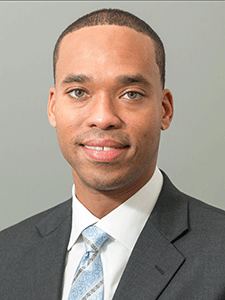 Dr. Mikhail Higgins performs first uterine artery emobolization at Doctors Hospital
Dr. Mikhail Higgins performs first uterine artery emobolization at Doctors Hospital
Many fibroid sufferers over the years, opt to live with their fibroids, rather than take advantage of the options that were previously available to them, but Dr. Mikhail Higgins is providing a fourth option through which women can reliably be treated, minimally invasively.
Higgins performed the first uterine artery emobolization (fibroids and adenomyosis) for symptomatic fibroid management one week ago in New Providence at Doctors Hospital on Janelle Sands. In the treatment, fibroids are treated through their blood supply from a two to three-millimeter incision in the skin without surgery, reducing blood flow to them. It’s a uterus-saving procedure that offers quicker recover than surgery.
Higgins is bringing relief to women whom he said have been quietly fighting a battle they did not want to discuss.
“A lot of women don’t make a decision to move forward with the options that exist, most people decide to kind of live with this, and I’m just so excited to offer and support a service to women in The Bahamas whereby they can reliably treat this issue that is minimally invasive.”
For Higgins, most devastating is the fact that many women opt to live quietly with their battle, with the belief that they can’t talk about what they’re going through – heavy periods, not being able to go out to work – these aren’t the kind of things that are life or death but enough to make your life miserable.
Then he said there are the other symptoms related to size of the fibroids that can include constipation, increased urination, which many women can think is normal, but are not, until they’re forced to seek a surgical option, or the worst option – suffer through it.
“My goal is to serve people through my skill set, and one of a variety of conditions I treat that happens to be an epidemic in The Bahamas.”
In the image-guided procedure, Higgins enters through a little blood vessel, a needle the size of two sewing needles and “I thread a wire through that hole, place a catheter in that hole and navigate my way to the blood supply and block it off, so the whole vascular blood supply is cut off”.
Higgins did the surgery on Sands who had approximately five fibroids – one very large and four ranging between golf and tennis ball-sized.
Unlike other options with downtime encompassing multiple weeks, Higgins said most patients are discharged the day following the procedure, and that most women can return to work within seven days. He said many are surprised at the short convalescence.
Vascular and Interventional Radiology (IR) represents an exciting new frontier in pain and disease treatment, according to the doctor. He said the therapies offered by IR are more precise, minimally invasive and more effective than ever. IR offers the patient and the doctor new options in The Bahamas to treat and mitigate disease and ultimately restore you to your best health.
“IR is built on a simple principle. We treat disease from the inside out, minimizing physical trauma to the patient. IR offers procedures for all the body’s organ systems and provides a progressive and now locally viable alternative to the more invasive nature and increased risks posed by open surgery.”
The first surgery in The Bahamas was performed on Tuesday July 13.
An interventional radiologist is a doctor who has undergone extensive training in the treatment of various vascular and nonvascular diseases. A traditional radiologist has extensive knowledge in detecting disease and abnormalities through various diagnostic imaging tests. Alternatively, an interventional radiologist combines extensive multi-system clinical knowledge with diagnostic radiology expertise and minimally invasive image-guided treatment skills – to direct therapy to the required area in the body.
Today, interventional radiologists are capable of successfully treating various diseases in men and women, including uterine fibroids, benign prostatic hyperplasia (BPH), pulmonary thromboembolisms (PE), cancer, blockages, fractures and more.
Using state-of-the-art imaging guidance, Higgins said they use the body’s vascular system or cross anatomical planes to directly deliver a precise targeted therapy to treat the actual source of the problem.
Higgins is The Bahamas’ first board-certified fellowship-trained interventional radiologist, and part of the Family Medicine medical team.
Some of his professional minimally invasive expertise includes women’s health, including endovascular management of uterine fibroids, adenomyosis and pelvic congestion syndrome, prostate artery embolization for BPH and acute urinary retention, vascular interventions for peripheral artery disease, varicocele, deep vein thrombosis, varicose veins, compression fractures, liver and renal tumors.
Shavaughn Moss
The Nassau Guardian
Published: July 20, 2021
